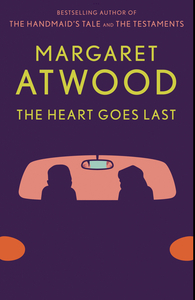Take a photo of a barcode or cover
adventurous
dark
funny
fast-paced
Plot or Character Driven:
A mix
Strong character development:
No
Loveable characters:
No
Diverse cast of characters:
No
Flaws of characters a main focus:
Complicated
Disturbing, interesting, thought provoking, I loved it!
The premise for this story could have made an interesting book, but that is the only good thing I can find to say about it. I guess if Atwood has gone with the alternate working title “Prison Sex Robots”, some may have shied away.
Reading this was an exercise in disappointment. Maybe in a few days, now that I’m done, I’ll be able to stop periodically looking skyward and shouting “Why, Margaret Atwood, WHY?!”
Reading this was an exercise in disappointment. Maybe in a few days, now that I’m done, I’ll be able to stop periodically looking skyward and shouting “Why, Margaret Atwood, WHY?!”
I generally love Atwood's wry humour and thoughtful writing. Unfortunately 'The Heart Goes Last' doesn't quite deliver on usual style.
Unlike a lot of the reviews I read, wasn't exactly the sexual gratuitousness of the book that put me off. It was more like the gratuitousness of the sexual angle in the book.
The Heart Goes Last was first written in episodes, which might account for why this book feels roughly hewn together. It's a book about freedom - sexual freedom, especially. But the conceit of the narrative, the Positron Prison/Consilience experiment, quickly becomes a backdrop. The whole economic collapse and commodification of prison idea promised early in the book is never fully realised. There are very few actual scenes set in the prison complex, and the concept behind the project is only explored briefly.
Instead, the first half revolves mostly around a series of 'switch' days, where civvies move to prison and prisoners are freed for their monthly rotations. And the shennanigans that take place during those brief opportunities.
The latter half of the book you'd be forgiven for forgetting there was ever a prison, or any rigid social structure in place at all. The theme morphs completely into a novel about sex and sexuality.
The issue for me is that the sexual references are so over the top and squeezed in at every opportunity as to lack any subtlety. Added to this the fact that most of the secondary characters feel like sexual props more than actual characters, and the book rings pretty hollow. Even the main characters don't quite ring true, with Charmaine and Stan both reflecting and thinking things that don't suit the moment, or smack of telling not showing.
And for a book which is so fundamentally about sex, it's kind of peculiar that there aren't actually any sex scenes in it at all. For all its dirty talk, the book always looks away right at the last moment.
The result is a confused book that feels cobbled together. Many of the scenes feel drawn out for the sake of it, adding little to the character depth or the plot. I almost stopped reading about halfway through, but it does pick up a bit. If you have a pile of Atwood books to get through, I would pick any other first.
Unlike a lot of the reviews I read, wasn't exactly the sexual gratuitousness of the book that put me off. It was more like the gratuitousness of the sexual angle in the book.
The Heart Goes Last was first written in episodes, which might account for why this book feels roughly hewn together. It's a book about freedom - sexual freedom, especially. But the conceit of the narrative, the Positron Prison/Consilience experiment, quickly becomes a backdrop. The whole economic collapse and commodification of prison idea promised early in the book is never fully realised. There are very few actual scenes set in the prison complex, and the concept behind the project is only explored briefly.
Instead, the first half revolves mostly around a series of 'switch' days, where civvies move to prison and prisoners are freed for their monthly rotations. And the shennanigans that take place during those brief opportunities.
The latter half of the book you'd be forgiven for forgetting there was ever a prison, or any rigid social structure in place at all. The theme morphs completely into a novel about sex and sexuality.
The issue for me is that the sexual references are so over the top and squeezed in at every opportunity as to lack any subtlety. Added to this the fact that most of the secondary characters feel like sexual props more than actual characters, and the book rings pretty hollow. Even the main characters don't quite ring true, with Charmaine and Stan both reflecting and thinking things that don't suit the moment, or smack of telling not showing.
And for a book which is so fundamentally about sex, it's kind of peculiar that there aren't actually any sex scenes in it at all. For all its dirty talk, the book always looks away right at the last moment.
The result is a confused book that feels cobbled together. Many of the scenes feel drawn out for the sake of it, adding little to the character depth or the plot. I almost stopped reading about halfway through, but it does pick up a bit. If you have a pile of Atwood books to get through, I would pick any other first.
This was an odd one for me. It is Atwood yet it didn't feel like the other of her books I've read. It was about a dystopian future where our main couple Charmaine and Stan live in an isolated community called Consilience, and alternate life in this controlled environment to life in Positron prison. This is all part of the lifestyle package to ensure productivity and security.
Early on the story was about Charmaine's affair with Max, which (for me) felt weird. I guess I didn't like Charmaine or Stan as characters so I didn't really care.
I liked the whole idea that Positron was essentially a body farming institution, but this wasn't focused on enough even though half the plot was about Stan (and presumably Charmaine) escaping their life contracts in Consilience. Since their lives were neat and tidy in Consilence I kinda missed how Stan was even slightly motivated to escape, so again I didn't care.
The politics of Consilience/Positron was interesting but I found the plot and characters to be odd.
Early on the story was about Charmaine's affair with Max, which (for me) felt weird. I guess I didn't like Charmaine or Stan as characters so I didn't really care.
I liked the whole idea that Positron was essentially a body farming institution, but this wasn't focused on enough even though half the plot was about Stan (and presumably Charmaine) escaping their life contracts in Consilience. Since their lives were neat and tidy in Consilence I kinda missed how Stan was even slightly motivated to escape, so again I didn't care.
The politics of Consilience/Positron was interesting but I found the plot and characters to be odd.
medium-paced
adventurous
funny
fast-paced
Plot or Character Driven:
Plot
Strong character development:
No
Loveable characters:
No
Diverse cast of characters:
No
Flaws of characters a main focus:
Complicated
i can't believe i'm giving atwood such a low score, but i really didn't care for this one. I was mostly intrigued about the dystopian start to the novel and all that, but then it just kind of crumbles into lengthy descriptions of how the main characters have sex with one another. It was not interesting nor erotic. also the way Charmaine thinks sounds so vapid (but then we're also expected to believe she has a dark side? The ending was pretty meh and predictable as hell. It would've perhaps been better to see all the cards falling from within Positron rather than from outside.
not great.
not great.


